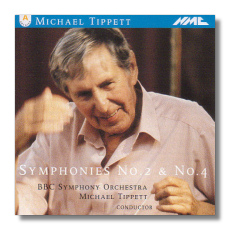
The Internet's Premier Classical Music Source
Related Links
- Tippett Reviews
- Latest Reviews
- More Reviews
-
By Composer
-
Collections
DVD & Blu-ray
Books
Concert Reviews
Articles/Interviews
Software
Audio
Search Amazon
Recommended Links
Site News
 CD Review
CD Review
Michael Tippett

Symphonies
- Symphony #2
- Symphony #4
BBC Symphony Orchestra/Michael Tippett
NMC NMCD104 m DDD
If memory serves, these works were originally issued in 1995 with the BBC Music Magazine. So ten years on it is providential to have them available again, and particularly this year when the music world is celebrating Tippett's 100th anniversary. Let me say straight away that these interpretations, by the composer himself, do not dislodge Richard Hickox's splendid recordings for Chandos. The latter versions get to the very soul of the music with remarkable insight, and Hickox manages to bring out every nuance of these difficult scores.
Martin Cotton informs us that the project almost fell through, and this is well reflected in the results, as in both recording and interpretative terms, the finished product is far from ideal. It was only due to the determination of the BBC Symphony Orchestra added to Tippett's wonderful good humour that the recordings were completed in the time allocated; three days in March 1993.
The Second Symphony, which the same orchestra premièred in February 1958 at the Royal Festival Hall under the baton of Sir Adrian Boult, is in four movements. Tippett informs us that these movements were to reflect four different emotional states, namely: joy, tenderness, gaiety and fantasy. In spite of its extremely fiendish 'scherzo', the Symphony contains a certain balance and songlike character that give it an all round effect of courage and bravery.
The Fourth Symphony was commissioned by the Chicago Symphony Orchestra, who gave the première on the 6th October 1977 under the direction of Sir Georg Solti. It is composed in a single, continuous movement somehow relating to Sibelius Seventh in style, and to Liszt's, Strauss' and Elgar's symphonic poems where dramatic dimension comes in. Tippett called it a 'birth-to-death' piece.
Although this work leaves the listener somewhat satisfied, I am still under the impression that it was not given enough time to solidify. The overall effect of these works is that Tippett was a symphonist of great technical skill and expressive ability. Although not the best versions, the historical value of these recordings makes them worth buying, especially during this Tippett year.
Copyright © 2005, Gerald Fenech




















